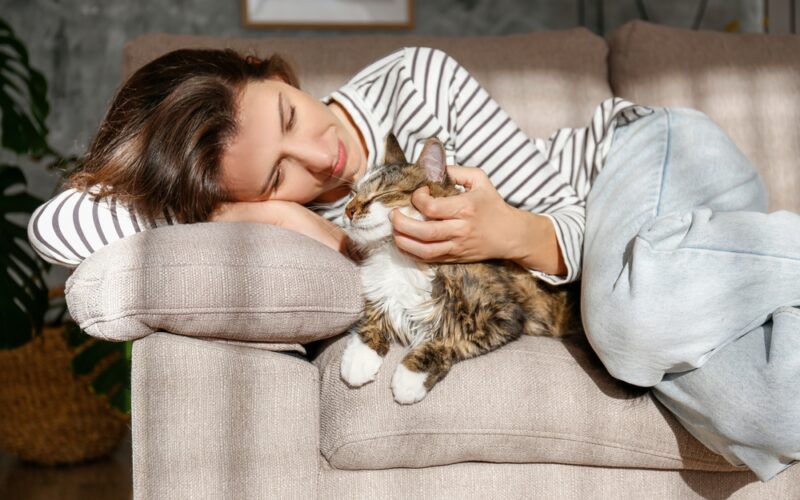Cats make wonderful emotional support animals with their soothing purrs, gentle presence, and intuitive ability to sense emotional needs. While dogs often get more attention as support animals, cats offer unique benefits that make them ideal companions for many individuals seeking comfort and stability in their lives.
The right emotional support cat provides companionship without the high-maintenance care some other pets require. Their independent nature means they can offer comfort while still allowing you space when needed – a perfect balance for many people managing anxiety, depression, or other emotional challenges.
Key Traits to Look for in an ESA Cat
When considering a cat for emotional support, focus on characteristics that align with your specific needs and lifestyle.
Temperament is perhaps the most important consideration. Some cats naturally seek human interaction and physical closeness, making them excellent companions for those who benefit from constant reassurance. Others maintain more independence while still forming strong bonds, offering support without demanding constant attention. Consider whether you thrive with frequent interaction or prefer quieter companionship.
Adaptability matters tremendously for emotional support animals. Cats who adjust well to changes in routine or environment provide consistent support even during life transitions. This flexibility ensures your emotional support remains steady when life feels unpredictable.
Activity level should align with your lifestyle. Some individuals benefit from a playful, energetic cat who encourages movement, while others prefer a calmer companion who specializes in peaceful lounging. Your daily routines should complement your cat’s natural tendencies.
Best Emotional Support Cat Breeds
Several cat breeds consistently demonstrate qualities that make them excellent emotional support companions.
Ragdolls are affectionate, docile cats that often go limp when held and actively seek human companionship. Their patient, calm demeanor makes them excellent companions for those dealing with anxiety or stress. Ragdolls typically enjoy being held and will often follow their owners from room to room. Their plush coats require regular grooming, which many owners find soothing.
Maine Coons combine playfulness with a gentle, sociable nature. Despite their impressive size, these cats typically display a sweet temperament and bond deeply with their humans. Their intelligence allows them to learn routines and respond to emotional cues. Maine Coons enjoy interactive play without being overly demanding, striking a balance between engagement and independence.
Siamese cats offer devoted companionship with their outgoing, vocal personalities. These talkative felines form strong attachments to their owners and aren’t shy about communicating. For individuals who benefit from active interaction, Siamese cats provide responsive companionship and unwavering loyalty. Their short coats require minimal grooming.
British Shorthairs present a perfect middle ground for many emotional support seekers. These sturdy, even-tempered cats offer affection without neediness. They maintain a calm presence, providing steady support without demanding constant attention. For those who appreciate companionship balanced with independence, British Shorthairs offer an ideal temperament.
Hypoallergenic Cat Breeds for Emotional Support
Allergies needn’t prevent you from benefiting from feline emotional support. Several breeds produce fewer allergens, making them better options for individuals with sensitivities.
Balinese cats share many personality traits with their Siamese relatives – intelligence, playfulness, and devotion – while producing fewer allergens. These social, affectionate cats make excellent companions for allergy-prone individuals seeking emotional connection.
Siberians might seem unlikely candidates for allergy sufferers given their luxurious coats, but they actually produce less of the problematic protein that causes most cat allergies. These patient, playful cats adapt well to various living situations and form strong bonds with their humans.
Devon Rex cats stand out with their distinctive appearance and hypoallergenic qualities. Their unusual coat produces fewer allergens, while their playful, people-oriented personalities make them excellent emotional support companions.
Final Considerations Before Getting an ESA Cat
Finding your perfect feline match requires thoughtful consideration of both the cat’s needs and your circumstances.
Lifestyle compatibility forms the foundation of a successful emotional support relationship. Consider your living space, daily routines, and social patterns when selecting a breed. The right match ensures both you and your cat thrive together.
Long-term commitment deserves serious consideration, as cats can live 15-20 years. Choose a breed that can adapt to potential changes in your living situation or lifestyle over time to ensure consistent support throughout your relationship.
Working with professional healthcare providers ensures your emotional support animal truly addresses your specific needs. Through Heally’s network, you can connect with healthcare professionals who understand the benefits of emotional support animals and can help determine if a cat might complement your mental health treatment plan.
Schedule a consultation with Heally today to discuss how an emotional support cat might benefit your mental health journey and receive guidance on selecting the breed that best suits your needs.
Sources
US Service Animals: Emotional Support Cat Breeds
Purina: Top 10 Therapy Cats for Comfort and Support
ESA Doctors: 6 Best Cat Breeds for Emotional Support

